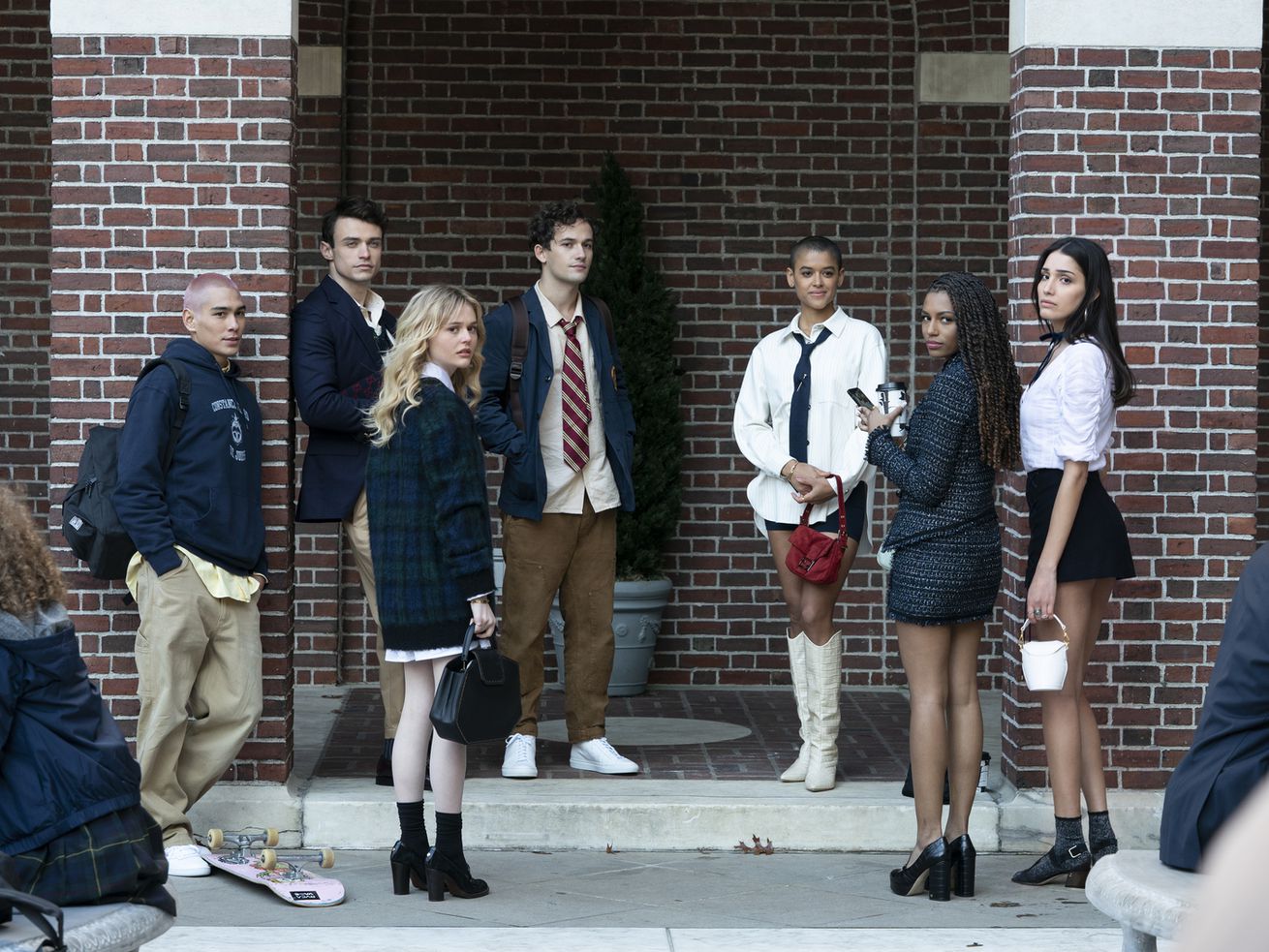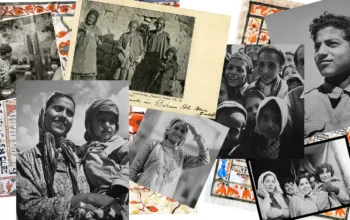HBO Max’s Gossip Girl reboot is an expensive, tired retread.
It’s hard to imagine that anyone was craving more Gossip Girl.
The original version of the show, a glossy and cold-hearted soap about the glamorous foibles of wealthy Manhattanite teens, was a sensation when it first premiered on the CW in 2007. It was the coolest new show on TV, and watching it felt like grabbing a boozy brunch with your perfectly coiffed friend who flies into town once a month to recuperate in between threesomes in Paris and coke binges in Berlin: Oh, so that’s how the other half lives.
But by the time it ended in 2012, six seasons and countless love triangles later, Gossip Girl had grown stale and exhausting. It began repeating its stories over and over again; with each iteration, they seemed to get a little colder. The show’s ratings fell off a cliff. In its final season, it regularly pulled under a million viewers per episode, down from a peak of 3.38 million in 2008.
Nevertheless, on July 8, Gossip Girl will be back on HBO Max under the auspices of Josh Safran, a writer-producer on the original show. Watching it feels like that same glamorous old friend has called you up for brunch again, ready to repeat the same handful of stories they’ve already told you a thousand times, and oh, would you mind footing the bill, too? Times aren’t what they used to be.
The new Gossip Girl is, loosely speaking, an in-universe continuation of the old, taking place at the same viciously rich Upper East Side high school with a new set of students, nine years after the original show ended. Our new queen bee is Julien (Jordan Alexander), an Insta-famous influencer who mouths platitudes about how she doesn’t believe in hierarchies while maintaining a white-knuckled grip on the school’s social scene. Her chief rival in that effort is her estranged half-sister, middle-class Zoya (Whitney Peak), who transfers into the school and immediately captures everyone’s attention with her punk rock refusal to bow to the whims of high school authority.
This dynamic is — as you will note if you watched the original Gossip Girl, and which the show self-consciously lampshades — very Serena and Blair redux. It’s one of many ways the new Gossip Girl feels less like a continuation than like a remix: The exact same set of characteristics that animated the original cast have been scattered merrily through a new and photogenic cast of newcomers, who are, in keeping with the times, less white and less straight than the originals.
Which means very little about Gossip Girl feels new. It’s just the same old show with a face-lift and a bigger, streaming-friendly budget.
Cross Dan’s judgy social conscience with Nate’s prince of the Upper East Side status and you get Obie (Eli Brown), the wealthy anti-gentrification activist torn between Julien and Zoya. Julien combines Blair’s killer social instincts with Serena’s effortless fashion sense, while Blair’s ice princess primness goes to Julien’s best friend Audrey (Emily Alyn Lind). You could practically draw a graph.
Frankly, the original Gossip Girl did not really have enough personality traits to sustain its first cast, let alone a new one. (Disclosure: I come to this new show as a viewer who found the original to run a maddening spectrum of nearly brilliant to unwatchably awful, but I also watched almost every episode, with the exception of the final season.) The new show is reiterating the same set of tired tropes as the first, so even four episodes in, it has acquired an exhausting sameness. You feel you’ve already seen all of it before.
The biggest difference between the new Gossip Girl and the old is also perhaps the show’s most wackadoodle plotline. Now as then, our cast of teens is tormented by an anonymous and omniscient blogger, the titular Gossip Girl, who is tasked with revealing everyone’s scandalous secrets at the most inconvenient possible time, and with providing a thematic voiceover at the end of each episode to explain how all of the show’s subplots are secretly about the same thing. (She’s still voiced by Kristen Bell, who I hope to god is being paid well for the word salad she keeps purring in her most scandalized voice.)
While original Gossip Girl never planned to reveal the Girl’s identity, however, the new Gossip Girl has made her central to the show, in an absolutely bonkers way.
The new students of Constance Billiard School, we learn, are terrorizing their underpaid teachers with bitchy quips about their Zara wardrobes and threats to get them fired for giving out bad grades.
But it wasn’t always like this, one teacher explains. Back in 2009, all the students were well-behaved model pupils who respected authority because they were all being terrorized into submission by Gossip Girl. And doesn’t that story just give the new teachers an idea!
Before long, the teachers are happily filming their underage students changing in front of windows, digging up smut on all the cool kids, and publishing the results on Instagram for all the world to see. In exchange, they get to revel in a more respectful, more thoughtful school environment.
None of it makes any sense from top to bottom, but Gossip Girl has always been at its most fun when it stopped clinging to such old-fashioned constraints as “coherent plotting” or “character motivations that make sense.” Gossip Girls United Against the Bullying of Teachers comes from the same well of nonsense that birthed such plotlines as Serena Kills a Guy and Blair Becomes Princess of Monaco, and as such it breathes some welcome life into the new series. It’s also a window into what the new variation on the show does pretty well.
The chief architect of the new Gossip Girl plan is English teacher Kate Keller, played by the writer, editor, and proto-influencer Tavi Gevinson. Gevinson is not a natural actress, but her very presence functions as a campy, smirking wink to the audience: Unlike the old CW Gossip Girl, the new HBO Gossip Girl will understand the social currency of the internet. Or at least, the wealthy New York media personality corners of the internet.
When Gossip Girl can unite its camp ridiculousness with its meticulous understanding of what Manhattan clout looks like in the age of Instagram, it starts to soar. Like when Princess Nokia backs out of a private performance at one of Julien’s parties because Julien’s been canceled for a fat-shaming tweet she wrote at 13, but then has to agree to perform after all when Julien rebrands the party as a fundraiser for lupus research in honor of her dead mother. Or when the gang goes to see the new Jeremy O. Harris play at the Public, and then Harris asks 14-year-old Zoya — who, chicly, has her doubts about Hamilton’s racial politics — to come party with him in the VIP area because he’s so interested in her thoughts on how Broadway needs to evolve. All those moments are the kind of silly, soapy fun at which this show knows how to excel.
Yet while Gossip Girl has savviness galore when it comes to the complexities of clout-chasing, when it comes to making its characters feel like real and interesting people, it has no idea what it’s doing. Which wouldn’t be so bad if Gossip Girl didn’t have aspirations to make you care about its characters and to develop some sort of heart.
It wants you to root for Zoya and Julien to become friends as well as sisters, even as it revels in the sudsiness of their on-again-off-again rivalry. It wants you to care about lothario Max (Thomas Doherty) and his fraught relationship with his two dads, even as it shows him seducing his classics teacher in the school showers. It even demonstrates a touchingly naive belief that its audience will take Julien’s decision to drop filters and makeup for a day as a sign of her revolutionary honesty, and not as a classic iteration of an influencer with good bone structure flexing on her audience with a #nomakeup #nofilter selfie.
The new Gossip Girl careens back and forth between giving its audience frothy, minutely observed rich-people hijinks, and serving up shopworn and sentimental clichés about teen soap archetypes with the apparent belief that viewers will embrace them with a ready hand.
That’s a problem the original Gossip Girl ran into over and over again, too. Except in that case, the show had a secret weapon: Leighton Meester. Meester was cast as Blair, original Gossip Girl’s ice queen, but she developed into the beating heart of the show, memorably described by another character as a “95-pound, doe-eyed, bon-mot-tossing, designer-label-whoring package of girly evil.”
The exhaustive Gossip Girl recappers at Daily Intel used to joke that Blair had access to another, better writers’ room than the rest of the characters did, but what they meant was that Meester was capable of making even bad jokes sound clever. She could make you cry or make you cringe in delicious sympathy with whichever of Blair’s minions she was cutting down to size for buying her shoes at a discount, and it’s thanks to Meester’s efforts that the show ever worked as well as it managed to.
So really, did anyone ever want more Gossip Girl? Or did they just want more of Leighton Meester saying bitchy things in a variety of fetching headbands?
That’s not something the new Gossip Girl can provide. And without Meester or her equivalent talent on its side, it simply doesn’t have the skill to pull off what it’s trying to pull off. Which makes it feel, in the end, like the worst thing a reboot possibly could be: unnecessary and unexciting.
You don’t have to keep meeting your exhausting, toxic frenemy for brunch to hear the same handful of stories another thousand times, even if they’ve promised to sprinkle in a few new bon mots. It’s time to unfriend and unfollow.
Author: Constance Grady
Read More



